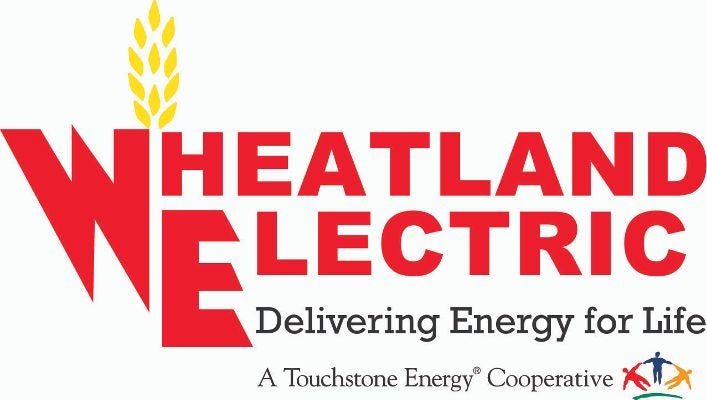Editor's note: This article was first published in our 2022 Annual Report, where you can find more information about the history of our electric cooperative and our 75th anniversary (1948-2023).
Kansans understand the threat of severe weather.
WEC takes measures to prevent outages and ensure power is delivered to all our territories; however, Mother Nature is still unpredictable.
Since 1948, we’ve faced floods, tornadoes, fires and blizzards, just to name a few of the natural disasters that have challenged our co-op.
The Blizzard of 1957
A history-making blizzard in March 1957 tore through southwest Kansas leaving some members without power for more than a month. Snow drifted so high, it covered clothes lines and trapped many at home for days.
During this time, many folks still had wooden stoves and oil lamps and could function by candlelight and without running water. Losing power today has a much larger impact, as much of our lives are powered by electricity.
Today, thanks to better tools and technology, WEC restores power more quickly and safely than ever before.
Back-to-Back Tornadoes in 1995
On May 15-16, 1995, WEC faced two tornadoes — back to back. Winds ranging from 40 to 80 mph during these disastrous events caused about 150 power poles to “snap like twigs,” according to one news report. Around 700 members lost power across Finney and Gray counties.
Several homes and farmsteads were damaged, including an estimated 50 center pivot irrigation systems. WEC crews worked from dawn to dusk
for weeks to repair the damage and restore power.
Crippling Ice in 2006
The details of a winter ice storm from Dec. 28-31, 2006, are more easily recalled.
The weight of the ice was “so heavy that it crumpled Sunflower’s 345 kV steel structures like a monster had stepped on them,” said Rick Klaus, WEC director of operations.
In the Tribune and Leoti areas, snow drifts were so high they covered substation fences “to the point that you could walk on over to the other side.”
“Linemen would be working on a pole while ice was crumbling the structure next to them,” Klaus added. Crews worked around the clock to restore power.
District 7 Storm of 2008
In early August 2008, Harper and the surrounding area experienced a storm with devesting winds, causing over 80 downed poles, according to Denzil Reed, district manager.
By the next morning, line crews from Great Bend and Garden City were dispatched to assist with the damage, and red trucks could be seen for miles, working round the clock. As crews were just finishing up the last of the work and headed back to the warehouse, massive black clouds could be seen building their way, Reed said.
“Another large storm was moving through, wiping out 40 of the poles that were just finished, so Saturday morning, the guys were back at it again!”
Winter Storm Ursa Hits in 2017
With winds up to 70 mph and inches of heavy, wet snow, Winter Storm Ursa is simply unforgettable.
Scott City had an estimated 16 inches of snow on the ground, which caused 13,000 outages and damaged more than 1,125 poles. To add to the challenging situation, temperatures increased and the melting snow created difficult, muddy working conditions for line crews.
Thanks to help from a few locals with tractors and other heavy machinery, our crews were able to work through the mud and restore power to the area quickly and efficiently!
Winds Whip Great Bend in 2020
On June 21, 2020, a severe windstorm ripped through Great Bend causing outages and leading to a weeklong restoration effort.
The windstorm wreaked havoc, breaking poles and tree limbs. The wind also caused debris to fall through wires, and burn downs were caused by objects blowing through our power lines. Prior to this storm, our co-op had converted an easement underground, which ended up being the only easement in the area that did not lose power.
This test case encouraged us to convert more of our easements underground, and presently this work in Great Bend continues. WEC plans to convert all overhead easements with limited access to underground in the future, increasing reliability and reducing wind- and tree-caused outages.
Uri Makes History in 2021
Winter Storm Uri was a history-making event in more ways than one.
From Feb. 13-17, 2021, a polar vortex of ice and snow caused widespread damage to utility infrastructure across the Midwest, and historically low temperatures tested the U.S. electric grid.
For the first time in history, the Southwest Power Pool, which manages energy delivery for 14 states including Kansas, called for rolling blackouts (interruptions in power) across our region to combat the high demand for energy. For at least a dozen straight days, temperatures hovered below freezing, causing significant strain on energy supply and natural gas prices to skyrocket.
Despite the damage, destruction and difficulty, the co-op spirit was evident. Some industrial members voluntarily shutdown to conserve energy or used their own generation resources to operate.
Our residential members also conserved energy during Energy Emergency Alerts. Without this co-op spirit from all our members, this winter storm could have had much more devastating economic consequences.
Through Rain or Shine
Over the decades, we’ve been challenged by a number of natural disasters. However, we’ve always been there to answer the call.
No matter the power of Mother Nature, we promise to power your lives through rain or shine!









